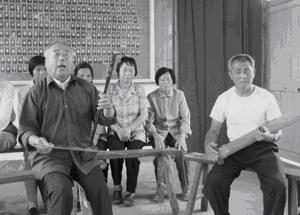History & Culture
Yiwu Daoqing
|
|
In the early summer of 2003, Yiwu City was conferred the title of ‘Home of Chinese Folk Art’ following a resolution by the China Federation of Literary and Art Circles and the Chinese Quyi Artists Association (Quyi: folk art), a special honor that has been granted so far only to Pingdingshan City of Henan Province and Shunde City of Guangdong Province. Yiwu Daoqing (Daoqing: an art form characterized by chanting folk tales to the accompaniment of percussion instruments) was originated in Wanli Period of the Ming Dynasty, which, like Shaoxing Lianhualao (popular ballad sung to the accompaniment of bamboo clappers), Wenzhou Rui’An Guzici (a kind of Dagu, consisting mainly of singing mixed with narration, accompanied by the beating of a drum) and Hangzhou Pingtan (storytelling and ballad singing in Suzhou dialect), has enjoyed a wide and extensive popularity in Zhejiang Province. Unlike other art forms, Yiwu Daoqing has no fixed tunes, and singers are allowed to give free rein to their own preference, depending on their voice features to create a pleasant effect. This accounts for the variety of schools of this art form that has been existing for a long time and that stands out from all others among the Quyi circles. In the early years after the founding of the People’s Republic of Since the reform and opening-up drive, Yiwu Quyi has experienced a boom period with folk art forms, such as Daoqing, Flower-drum Opera, Storytelling and Ballad Singing in Dialect, Xiaoluoshu, Two-man Comic Show, Cross-talk and Storytelling, vying for splendor. Ye Yingsheng took the lead in further developing this age-long art. Ye, Vice Chairman of Jinhua Quyi Artists Association and Director of Zhejiang Province Quyi Artists Association, started at the age of 12 to go among the fields, marketplaces, countryside, remote mountain villages and small teahouses, singing with a Yugu (bamboo percussion instrument) and two bamboo clappers. He was invited by Ministry of Culture and China Democratic League in 1996 to perform a Daoqing opera named “In Memory of Wu Han” in the CPPCC Auditorium, which brought Wu Puyue, sister of Wu Han, to tears. Ye Yingsheng and Jia Haoxiao, an old artist and former pear syrup peddler, were awarded the title of ‘Talented & Respected Artist’ by Zhejiang Provincial Quyi Artists Association. Ye also ranked among the first ‘Folk Artists’ by Zhejiang Provincial Department of Culture. Thanks to the strenuous work and efforts of the folk artists, Daoqing, the age-long solo art of storytelling and ballad singing has acquired a new lease of life. The old art form was strong in narration but weak in music. And Daoqing artists have thus made improvements in performance in a form of antiphonal singing, with the music in the traditional Wu Opera adopted and a small music band introduced. In addition, dialect and Yiwu mandarin are applied in the singing, which has broken through the limit of locality. And in content, apart from the traditional imperishable operas preserved, the artists attach more importance to realism. At a time, such themes as praises for new achievements in modernization construction, beautiful scenery and happy life in the new era have become the sources of inspirations for Yiwu artists. More than ten operas such as ‘Famous Chinese Mountains’, ‘Gun Yuanbao’, ‘Eight Immortals Pay New Year Call’ and ‘Ten Cups of Aromatic Tea’ have been video-taped by Zhejiang Art Audio-Video Publishing House. ‘ The vigorous real life has been an inexhaustible source for creative work of Yiwu Daoqing. Yiwu Quyi has become so popular that ‘where there is an open space, there is Daoqing Opera’. Luo Yang, Vice President of the China Federation of Literary and Art Circles and President of the Chinese Quyi Artists Association, praised Daoqing in his poem as ‘a mountain flower’, in which a line reads, ‘a mountain flower may not smell as flagrant, and yet it never bows amid severe colds’. |
